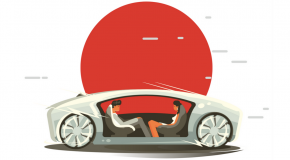Download PDF in English | 한국어
Only the highways have been completed so far but, once finished, K-City—one of the world’s largest testing sites for autonomous vehicles (AVs) and designed to mimic the conditions of a real urban road system—will contain bus lanes, AV parking zones, inner city and suburban areas, toll gates, pedestrian and train track crossings, tunnels, and even purpose-built potholes.
Costing the government W11bn (US$10.2m),1 K-City signals South Korea’s somewhat belated commitment to developing AV technology.
“South Korea is late to join the AV race,” says Taebong Koh, head of equities research at HI Investment & Securities. He says that’s partly because, compared with market leaders in the US and China, South Korean companies have struggled to fund research and development. “In the US, venture capital funds are more willing to invest in novel technologies, and the crowd funding model is also well established.” In China, huge tech companies such as Alibaba and Baidu have cash to spend, and benefit from government protectionism, he adds. South Korean investors are more conservative, and wary of new technologies that don’t offer guaranteed returns. Despite this, Mr Koh believes that South Korea, the sixth-largest car manufacturing country in the world,2 will catch up.
Although the South Korean government hasn’t issued an offcial roadmap for AVs, it has designated it one of 13 Industrial Engine Projects that will help grow South Korea’s economy. The Ministry of Trade, Industry and Energy budgeted W295.5bn to develop the sector between 2016 and 2022, and is co-financing, with industry, the development of detailed roadmaps and improved GPS accuracy that self-driving vehicles require, according to experts.
From 2016, the government started slashing red tape, allowing a number of companies to start testing self-driving technology on public roads across the country.
Giants in waiting
The South Korean car industry is dominated by Hyundai, which, together with its smaller affiliate Kia Motors, is the third-largest carmaker in the world.3
“Hyundai is currently on a par with industry leaders when it comes to introducing automated safety features,” says Mr Koh.
However, its competitors will pull ahead in the short term. Mr Koh says Hyundai’s target is to introduce Level 3 AVs—able to perform most operational tasks but which require a human driver to take over in certain circumstances—by 2020, and Level 4 vehicles, which are fully autonomous, with no steering wheel or foot pedals, by 2030.
“Korean car companies are not pioneers; they are fast followers,” says Mr Koh, adding that South Korean automakers excel at hitting a technology level just below that of industry leaders, but at a significantly lower production cost.
Historically, Hyundai and Kia have achieved competitive prices by maintaining a high level of vertical integration. “Their supply chain consists largely of their own subsidiaries,” says Mr Koh.
They want to keep it that way, he adds, noting that Hyundai is reluctant to buy AV technology from other suppliers, even though that would be a faster solution than developing it internally.
South Korean tech giants are also penetrating the AV sector, led by the world’s number one smartphone manufacturer, Samsung.4
Samsung doesn’t manufacture cars, but it is developing advanced sensor and computing systems to sell to carmakers as part of its broader strategy to lead development of the Internet of Things.
“Samsung is progressing via mergers and acquisitions,” says Esther Yim, auto and tyre analyst at Samsung Securities. It’s a major investor in Silicon Valley, and has bought a number of tech start-ups in Israel. In March 2017 Samsung completed a US$8bn acquisition of Harman International, a company that specialises in car navigation services, onboard entertainment systems and connectivity. The purchase, says Ms Yim, is intended to help scale up distribution networks quickly.
Electric dreams
The development of AV goes hand-in-hand with the pivot from petrol-powered to electric vehicles (EVs), even though uptake of full EVs has been slow in South Korea—annual sales came to around 11,000 units in 2017.5
“Electricity is expensive and charging points are quite scarce,” says Ms Yim, adding that the current driving range is only 190 km on a single charge.
Although South Korea is a top producer of the lithium-ion batteries necessary for EVs, China has the largest market share, accounting for 55% of global battery sales,6 and the Chinese government recently blocked sales of South Korean batteries, to support domestic manufacturers.7
With the market for lithium ion batteries guaranteed to soar during the next decade, South Korea may benefit in the near future but long term, says Ms Yim, “the competition will get tougher”, as China improves its technology, and global carmakers develop their own battery-producing capability.
A shared future?
Currently, it’s unclear what impact the AV revolution will have on private car ownership.
Ride sharing services such as Uber and Didi Chuxing, which are leading the development of AVs in other countries, are restricted in South Korea, where taxis are considered public transport and taxi companies are protected by strong labour unions.8
Technology companies including SK Telecom, Kakao and Naver are investing in platforms that facilitate car hailing and pooling, but “the government is very cautious about relaxing regulations, as that would involve revising public transport policy,” says Mr Koh.
Mr Koh says the Seoul metropolitan area, home to almost 24m people, is potentially a “golden market” for mobility-on-demand services. “Many people have a long commute,” he says, “and would benefit from improved transport services,” while urban areas will be the first to be equipped with the necessary infrastructure for AVs.
But collaboration is key, and the preference for vertical integration is hampering progress. “Development and commercialisation of AVs cannot be handled by just one company—partnerships are essential,” says Ms Yim.
Mr Koh agrees: “The Korean conglomerates will have to work together if they want to compete globally.”
Both agree that by making the right strategic alliances, Hyundai could move the projected date for the roll out of Level 4 AVs from 2030 to 2025.
“Otherwise,” says Mr Koh, “they are going to be left behind.”




